IM Sports Officials Rule the Court
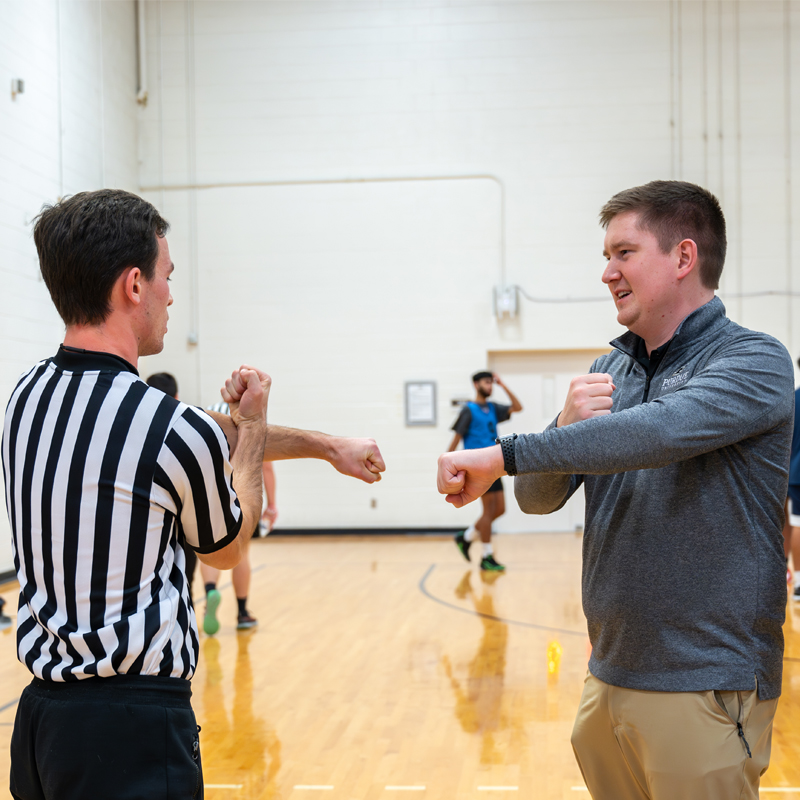
A sharp whistle blows and signals are thrown, indicating a call has been made. Though officiating can inspire emotional responses from those on and off the court, sports officials play an important role in ensuring competitive fairness with consistent application of rules and regulations. Without rules, sports descend to chaos. It takes a brave, confident and informed leader to make the necessary calls, being the keepers of the game. Purdue prides itself on preparing students to make the tough calls. Purdue’s intramural sports official program produces the next generation of highly talented and informed officials, ready to take on any sports game put in front of them.
The training process to be an intramural official through Purdue is very rigorous, enforcing a high standard of quality. Officials go through a five-day training program, each day targeting a different skill. The first day of training covers rules. Officials-in-training watch presentations on the rules for the sport they will referee and after presentations, run through stations to practice enforcing these rules. The next day focuses on fouls – how to call and report them as well as the basic mechanics behind fouls. Day three puts officials-in-training through practice games. Different intramural teams can sign up to play and allow officials to put their knowledge from the past two days to the test. Day four is a three-hour day of stations and day five is another day of practice games before officials are sent off to referee actual games.
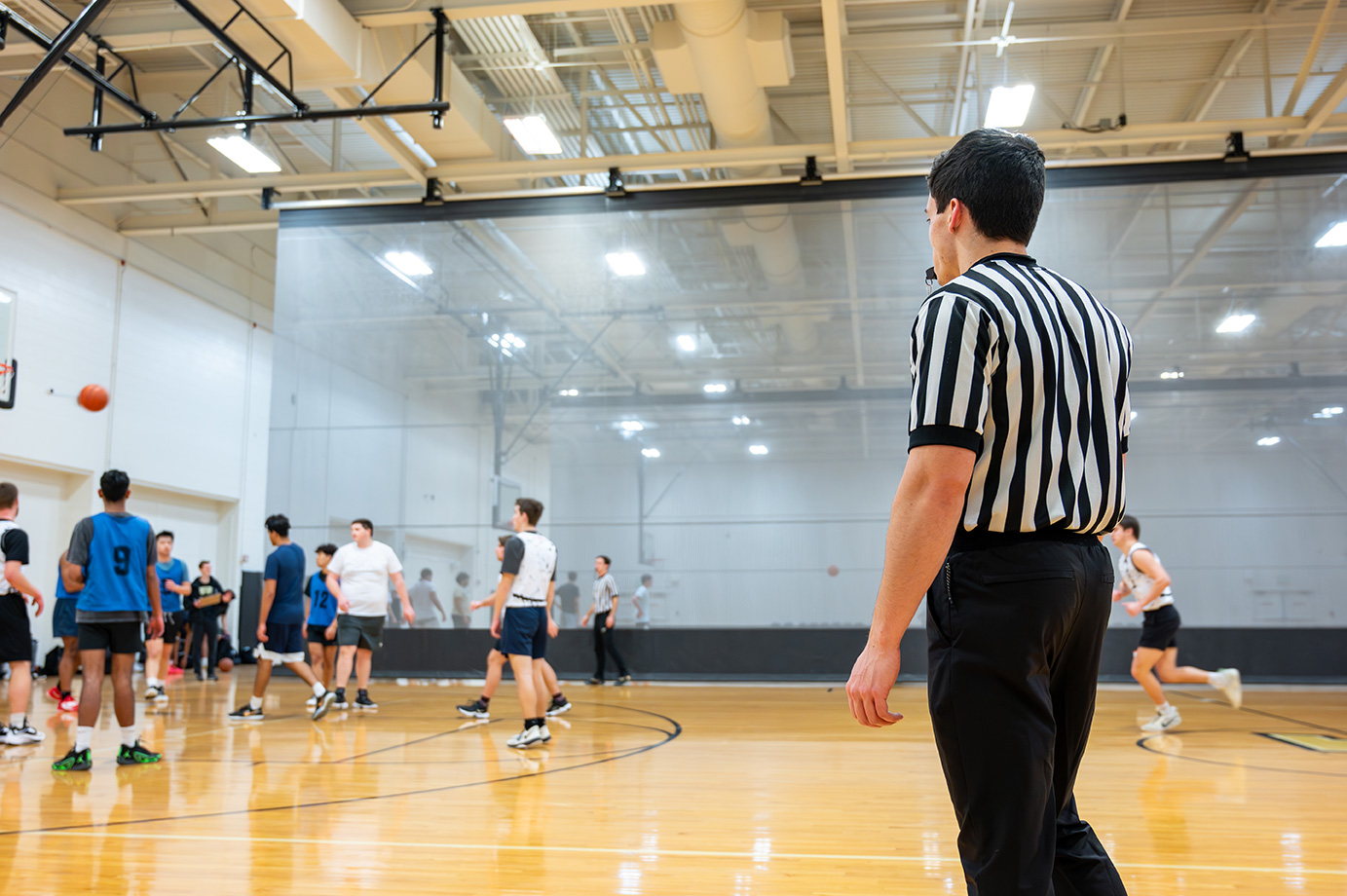
Jason Maynard, senior assistant director of sport programs, covers the details of what the training process looks like for new officials interested in joining.
“We do a very holistic training process involving classroom work,” Maynard explains. “We do presentations, video review, on-court stations, practice games and breakout groups with our 8-10 head officials who are extensions of our pro staff.”
Typical programs to train officials last an average of 2-3 days, but Purdue’s training process ensures well-rounded and talented candidates as a product of their program. A crucial part of the intramural official program at Purdue is the constant feedback staff receives in a development-centered environment.
At the All-Campus Basketball Invitational, an intramural basketball tournament for teams with high sportsmanship ratings, officials worked tirelessly to ensure that teams both followed the rules and upheld positive sporting behavior. Before halftime, Maynard writes specific notes to bring up during the halftime talk, with a growth mindset at the forefront of the officials' work. Rather than criticizing off the bat, he asks leading questions to allow officials to reflect on their work and he helps them learn to do better. After going through his talking points, he turns it over to student leaders to see what feedback they have to provide.
When asked about the feedback the program provides, Maynard says, “In campus recreation and sports programs, we want to be the example program that other universities look to. We want other colleges to ask, ‘What is Purdue doing?’ That was really the mentality, leading with this program. We want to keep building and bringing more people into this program and reinforce high standards.” 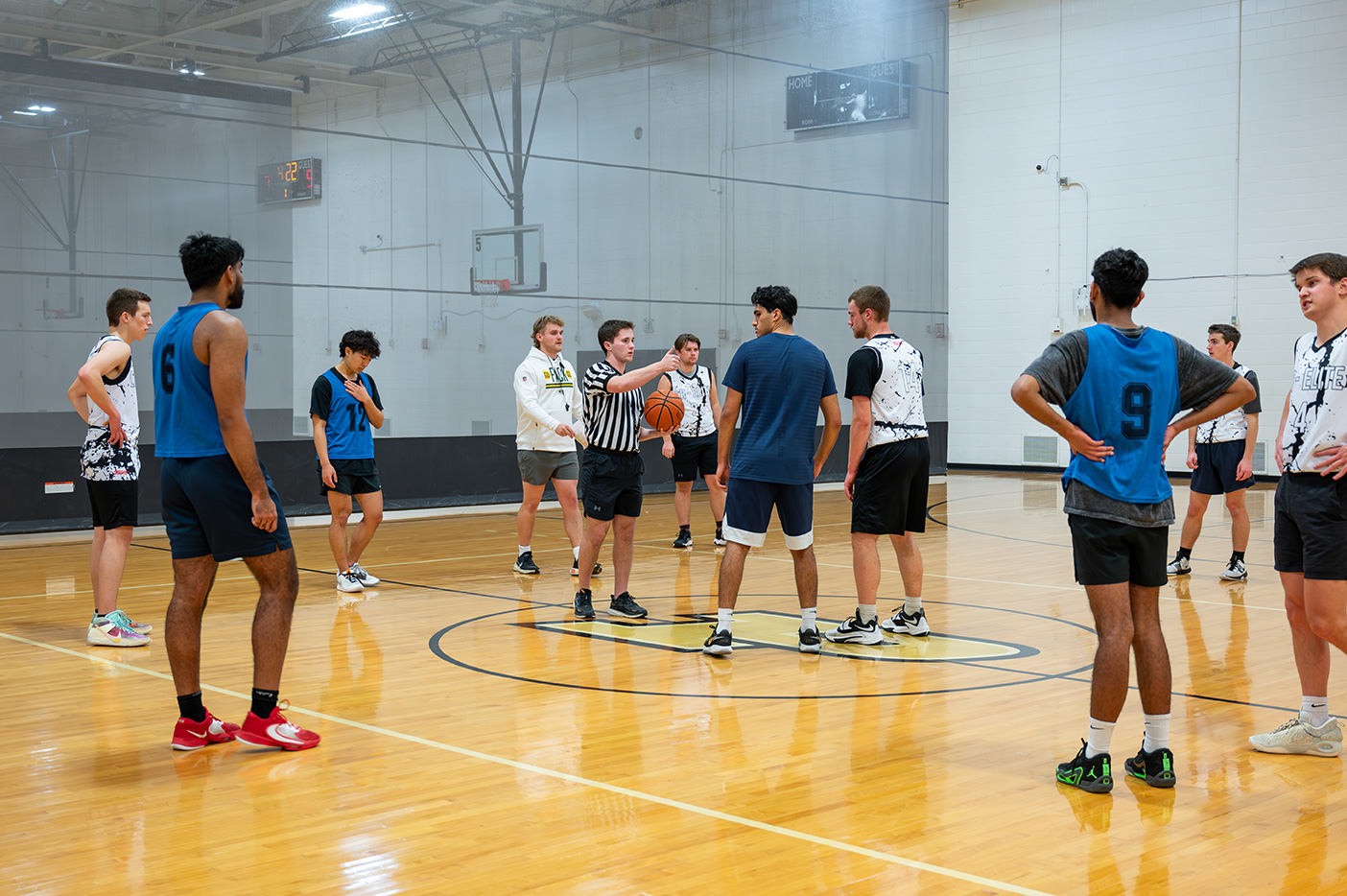
Keith Woolems, assistant director of sport programs, praises the development opportunities that the program provides.
“The amount of development that this program emphasizes keeps me connected to it,” he says. “We have a full eight-category rubric 1-4 that’s very well defined of what makes a good employee. Each semester focuses on that rubric. It keeps me so engaged and passionate about the program. That constant development is something you don’t see in most jobs, but this keeps students and staff engaged. You get more than just a paycheck out of this.”
Officials are evaluated based on their performance in a multitude of categories, including play calling, positioning, managing emotions, game management and intangibles. By working on these skills every shift, officials are cultivated into poised, finished products.
National Intramural-Recreation Sports Association (NIRSA), leaders in collegiate recreation, has a national basketball tournament and offers student officials the opportunity to work the games. Purdue was the only program to send three officials to referee at the national level. Usually, other programs only send one or two students. One of the officials produced by Purdue’s program ranked in the top 10 out of all officials.
“This is a program of excellence,” Woolems says. “It will stay that way because it is built that way. I am here to make small changes to keep an upward trajectory, but it is built really well.”
Participants in Purdue’s IM Sports Officials Program have found success not only within the program but on a larger scale as well. Graduates from the program have gone on to referee in the collegiate and professional ranks, including the NFL, NBA and WNBA. Purdue alums have officiated several major sporting events, including the Super Bowl.
Now, more than ever, it is essential for programs like these to stay alive and expand. Statistics show that officials are aging. Nationwide, there is a dire shortage of officials and, as more and more officials retire, it has been a challenge to replace them. Recognizing this problem, the officials program at Purdue works to have an impact in Indiana.
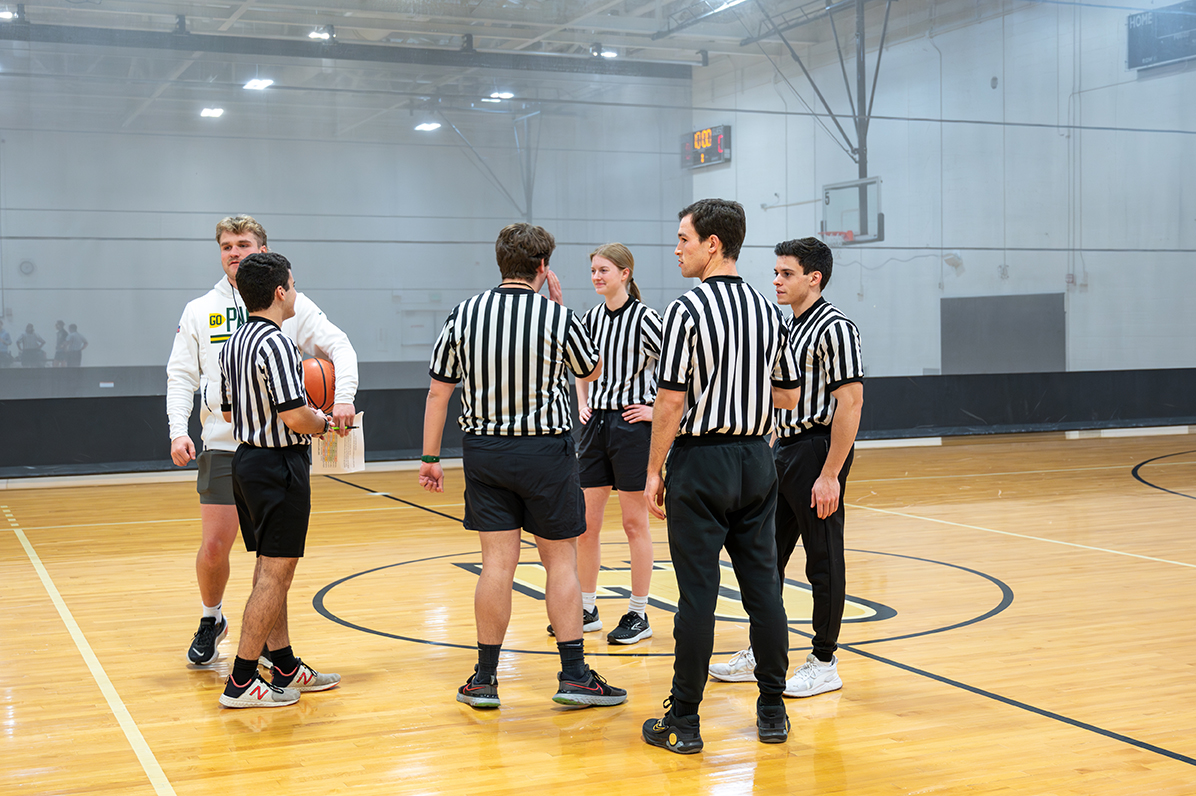
“We encourage younger officials to get involved and give them the confidence to go out into the community to referee high school games,” Woolems emphasizes. “It starts with us. We empower our young officials to lead the charge. Without officials, there are no games. We are contributing to Greater Lafayette, but also, we are contributing to the state as a whole by partnering with the IHSAA. We think a lot about leading the charge.”
Not only is the program an amazing opportunity to be involved as a college student, but it also provides amazing career opportunities for the future. Maynard and Woolems both entered the program as undergraduate referees, later finding great success as assistant directors of sport programs at Purdue.
After being an official for his first season, Maynard explains the next steps he took.
“I realized I really liked working sports after my first season, so as an official I applied to be a supervisor. I worked in these roles for two years and in my junior year I applied to be a head supervisor,” Maynard says. “There are only eight head supervisors, so these are our main student leaders and our top employees. I was studying social studies education, but I really liked doing this. I applied to be the professional intern for sport programs and after getting that internship, I moved up in roles and found my home here.”
Woolems had a very similar career path. Woolems reflects, “I first started with the intramural program in the fall of 2016. I started as a flag football and floor hockey official. From there I took off. I became a supervisor the next semester, did basketball and started early on in my career at Purdue. In a way it became my identity.”
Though he worked as a mechanical engineer for a year post-graduation, he found his calling back at Purdue.
“I wanted to find something that would fill my bucket,” Keith says. “I started my master’s, went to a different institution and when this job opened, I knew I wanted to come back. I started back here full-time in June of 2022 as the assistant director and it was really cool having that full circle moment. Before I looked up to the director roles and filling that role and being able to carry on the legacy they instilled in us was incredible.”
Maddie Prospero, a senior on her way to law school, discusses what being an official means to her.
“This program has been instrumental in me developing as a leader,” she details. “I came into this program without confidence and it empowered me to grow confidence. I felt strong enough to stand on my own and guide others. The program is so great with feedback and it’ll take you as far as you want to go. I’m a head official, so I get to teach others.”
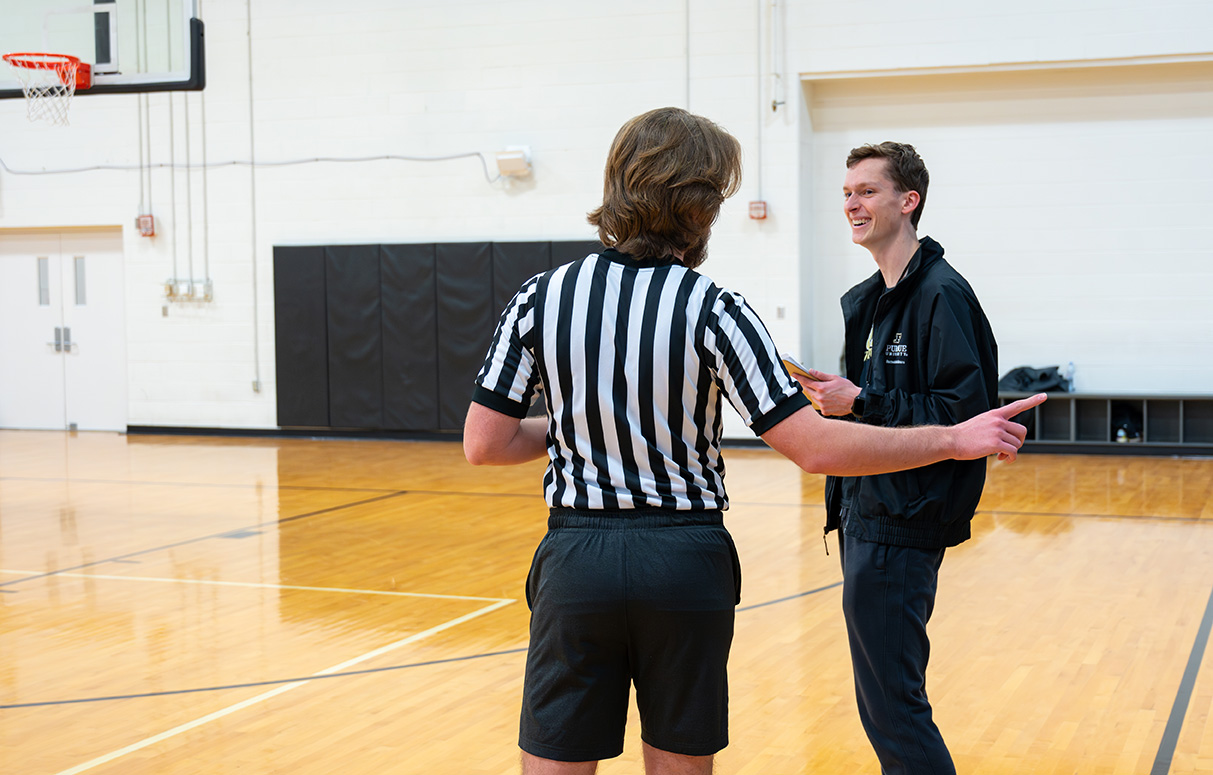 As Prospero heads into law school, she covers the skills the program has cultivated that will push her forward professionally.
As Prospero heads into law school, she covers the skills the program has cultivated that will push her forward professionally.
“Communication is a major skill that I’ve developed,” she explains. “When you officiate, you have to be able to talk to people and explain yourself concisely. Another major skill that I’ve learned is how to stay calm under pressure, especially when games are close and there’s a lot of pressure. It’s also helped me get better at taking feedback. I’ve been provided feedback in a very welcoming way here.”
Mairin Avart, a student starting a new position as supervisor, thinks about her history with the program.
“I started as a flag football official,” she reminisces. “I saw a flyer in my residence hall about refereeing. I wanted to learn new things and make new friends, so I signed up. I’m on my first season as a supervisor and an official. I started flag in the first couple weeks of school and applied in mid-November to be a supervisor. Everyone here is so nice and the community of it drove me to stick with the program. I’ve learned how to deal with conflict and I know how to be firmer. I know any time I have problems I can rely on my support system here."
The intramural official system is not only an incredible opportunity to develop as an individual, but it holds greater lessons.
“You learn to care about something bigger than yourself and someone other than yourself,” Woolems says. “This is a unique place where you care about your development, your coworker’s development and the growth of the program as a whole. It’s a shared experience.”
The Intramural Official program is always looking for new officials to pass the torch down to so that younger students may carry on the standards of excellence set forth by those before them. Students looking to cultivate valuable skills and make a bigger impact on their community can get involved by attending one of the three callouts. To learn more about the callouts available, visit their website.
Prospective officials must attend one callout. For those interested with questions, shoot an email to the IM Sports email.
 .
.